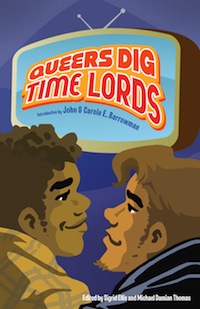I expected Mad Norwegian Press’ new addition to their “Digs” series to present a compilation of LGBT analyses and episodic interpretations of Doctor Who, but Queers Dig Time Lords went beyond that. Editors Sigrid Ellis and Michael Damian Thomas have collected a great combination of short essays and memoirs with topics ranging from geek “coming out” stories to everyone’s favorite slutty bisexual, Captain Jack Harkness. Capt. Jack himself—actor John Barrowman—along with his sister—writer and Whovian Carole Barrowman—introduce the anthology with all the genuine exuberance one might expect from such a duo. With their blessings in the cards, and with the addition of numerous other DW creators and contributors (Gary Russell, Nigel Fairs, and Paul Magrs just to name a few) alongside fans and other writers from throughout the SFF community, the anthology’s editors demonstrate just how diverse and far-reaching DW fandom has become.
I was lucky enough to have attended QDTL’s release party and contributors panel at last week’s WisCon37, where I received a great preview of what was in store. Julia Rios, contributor to both the anthology and to Outer Alliance (a group dedicated to QUILTBAG specific SFF), recorded this fabulous panel for an upcoming episode of the OA podcast. Be sure to check it out in the next couple of weeks to get an insider’s perspective on how and why the anthology came about.
The essays in QDTL fall into three primary categories—representation & subtext, growing up & coming out, and fandom. True to form, of course, the categories often overlap, so that we end up with works like John Richards’ “Heterosexual Agenda,” which bemoans Russell Davies’ sexualization of New Who. Many of these essays, in fact, discuss the Doctor’s relative asexuality as an aspect of his relatability. Growing up queer—understanding that there is something not-quite-right about yourself but without knowing what that is, and finding a safe space, without the threat of blatant heterosexuality—seems to have been pretty vital to folks growing up with the original DW. It is a thread that runs throughout the anthology, alongside the competing, glowing excitement for newly acquired representation, in the forms of Jack, alt. universe Mickey, and the Eleventh Doctor’s inter-species space lesbians.
One of the great strengths of QDTL, though, is the structure, which allows for the overlap of often-contradictory ideas. Were the Doctors of Old Who really asexual, or were certain regenerations “metro-sexual before the concept of metro-sexual even existed,” as Tanya Huff argues? Is Jack’s portrayal of bisexuality a negative stereotype or an optimistic vision of the future? Or, perhaps, subtext remains more powerful than the overt sexual revelations in more recent seasons. Amal El-Mohtar certainly argues in favor of the former in her essay on Pertwee’s Doctor and his kinky relationship with the Master; and Julia Rios, as well, seems to find more solace in companion Romana’s subtextual interactions with Professor Amelia Rumford in The Stones of Blood.
Some of my favorite essays of the lot, though, were more personal in nature. One in particular made me reconsider my reading of the entire series. Susan Jane Bigelow’s “Same Old Me, Different Face: Transition, Regeneration, and Change” tells the story of Bigelow’s transition to transgender woman through the lens of the Doctor’s regenerations—the subtle versus the overt shifts within the self, the desire to mourn and bid farewell to an old life, and to learn to embrace the new and unknown. She writes:
The moment of regeneration itself is one of the most magical Who moments. In a single instant, the Doctor becomes someone new. His number increases by one. It looks painful, some of the time, while other times it’s almost peaceful. It’s always breathtaking.
Bigelow relates to the Doctor on a fundamental level, and she argues that we all can— trans, queer and cisgendered alike. Change, she argues, is something vital, miraculous, and, yes, often terrifying. Her analysis is absolutely brilliant, and that the series could lend itself to such deep reading is a real testament to the universality of the source text.
Melissa Scott’s essay was another showstopper. As honest and as heart wrenching as Bigelow’s piece, Scott tells a different story entirely: this time, of her long-term partner Lisa A. Barnett, and their mutual adoration of the good Doctor. She weaves a story about risk and great possibility, themes that every DW fan is aware of, and she encourages her readers to take the plunge, step onto the proverbial TARDIS. Who knows, after all, how time and space might unfold?
Folks in the SFF community are already aware of just how great an influence fandom can be on our lives, but QDTL brings our analysis and experiences straight to the surface. Essays in defense of camp (Lee Mandelo) and of “childish” stories (Hal Duncan and many others) compliment the anthology’s unabashed pleasure in a series that has only very recently made its way into the mainstream. It is both a celebration of fandom and of the series itself.
These writers make me want to tell my own stories as a geeky queer—of how watching the Doctor through low points in our relationship brought my partner and me back together, closer than ever; how important DW was in my transition from fangirl to critic(al fangirl). These writers make me excited to be a part of a community that is at once aware of problematic media while simultaneously celebrating our advances. Like Doctor Who itself, QDTL made me laugh, cry, and every once in a while, stop to consider the lovely vastness of the universe. Queer or ally, you should probably read this book.
Queers Dig Time Lords is available now from Mad Norwegian Press.
Emily Nordling is a writer and activist from Louisville, Kentucky. She thrives primarily on tea, books, and justice.










